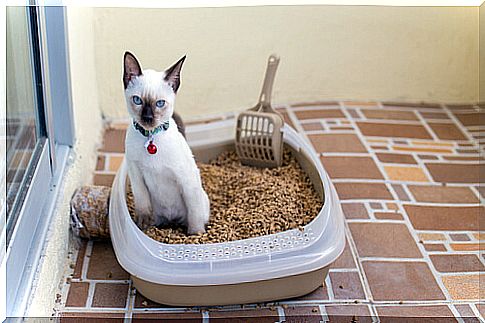Recognize Urine Infections In Cats

Cats are independent animals and we practically don’t have to worry about them. They don’t need to go out for a walk and they do their little things by themselves in a litter box. The latter makes it difficult for us to know if our animal has problems such as urine infections.
However, cats, like other animals, demonstrate through their behavior that something is wrong when this happens. Let’s see how to identify this disease, urine infections. It really is something more common than we think.
What are urine infections?
This includes any type of disease or condition that affects the bladder or urethra.
Although these types of infections are generally easy to treat, they can sometimes be a sign of something more serious. For example, nephritis, which is an inflammation of the kidneys, kidney failure, usually caused by a poorly healed bladder infection, or a kidney infection.
All this makes it extremely important that in the event of any warning of infection or another type of problem in the urine of our cat, we make an urgent visit to the vet, since the life of our pet could depend on that.
Symptoms of urine infections in cats

It is important to be aware of our kittens, because we must not assume that by relieving themselves in the sandbox, nothing will ever happen to them.
When something happens to them, they will present certain symptoms such as:
- Difficulty urinating. If you see that he begins to turn too much, that he shrinks to do it or any other gesture that you are not used to, do not hesitate and take him to the vet as soon as possible.
- Little quantity. If you urinate little but repeatedly, it is a sign that something is wrong.
- Complains when urinating. If it hurts when you urinate and meow or cry, something is definitely wrong.
- Licking of the genital area. If a cat licks its genitals excessively and even compulsively, it may be due to an itch caused by an infection.
- Urine out of the box. When you have discomfort or feel that something is wrong, you can try trying other places in the hope of finding relief.
- Bleeding in the urine. This is a sure sign that something is wrong.
- Vomiting, diarrhea, or poor appetite.
- Urine with a very strong odor. If you see that the urine smells much more strongly than normal, it may be an odor caused by an infection.
Whether you see some or just one of these symptoms, it is best to go to the vet to see your pet as soon as possible.
Why Do Cats Get Urine Infections?
There can be many causes for this disease, which is more common than we imagine.
Although viruses and bacteria that can be found in the environment or even in the water they drink can cause this condition, there are other factors that can influence.
For example, emotional stress or change is your routine. Cats are animals of routine, order and living in peace and tranquility. When something affects your life and generates sudden changes, your body suffers it. This could be a move or the presence of a new pet at home.
Being overweight or not exercising can influence the functioning of the urinary tract.
What to do

Above all, do not delay the visit to the vet. But in the meantime, if you think your cat has a urine infection, do this at home:
- Serve small amounts of food
- Give it clean water and to be able to be filtered
- If you only eat feed, add wet food to your diet
- Keep the sandbox clean
- If you have more than one cat, separate them and each have their own place to urinate
- Don’t make changes to your routine
With these tips and those that the veterinarian gives you together with the medication that he provides, you will be able to partially avoid and cure your cat’s urine infections.









